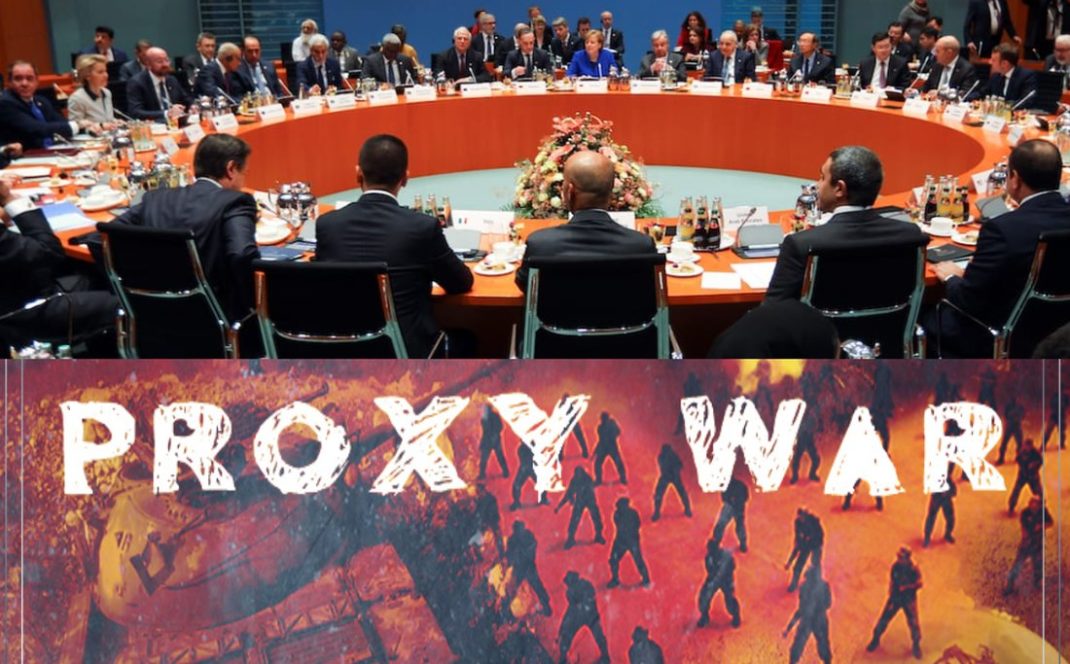By Edward P. Joseph & Jeffrey A. Stacey

 Libya is among the most intractable conflicts in the world today. Despite UN Secretary General Guterres’s global appeal for a cessation of violence during Covid-19 conditions—and the initial positive response from Libya’s chief combatant General Khalifa Haftar—intense fighting continues.
Libya is among the most intractable conflicts in the world today. Despite UN Secretary General Guterres’s global appeal for a cessation of violence during Covid-19 conditions—and the initial positive response from Libya’s chief combatant General Khalifa Haftar—intense fighting continues.
PART (IV)
Libya, the Preventable Conflict
Libya would appear to be the least likely candidate for a non-threatening external intervention intended to prevent conflict. Libya’s civil war, with multiple foreign powers intervening on both sides, is on the cusp of becoming if not the next Syria, certainly a wider civil-turned proxy war.
The important coastal city of Sirte has recently fallen, and the battle over the capital Tripoli has been joined by an influx of foreign mercenaries who have worked with the LNA to cut off the GNA’s oil exports. In a country equally surprising for teaching the world a series of “lessons learned” over the years—redolent of everything from “responsibility to protect” to “lead from behind” to “the day after”—seemingly the most ironic, if not tragic, is that involving conflict prevention.
Conflict prevention remains high on the agenda, for example, of Secretary General Guterres, but it can be a tough nut to crack. According to conventional wisdom, Libya has long been a morass of instability and strife, an archetypal example of how difficult both conflict prevention and post-conflict stabilization can be, in short a poster child of the perils of nation building.
However, a more accurate account of its recent history holds that after the forcible removal of its long-standing leader Colonel Qaddafi in 2011, Libya was in fact stable for two years prior to the onset of instability, as well as another year or so of increasing instability before eventually sliding more fully into intermittent conflict.
Casting aside the myth that Libya descended directly into post-Qaddafi chaos, a closer look at the early years and the squandering of a viable conflict prevention opportunity by Western powers is revealing. It took nearly three years for the gradual proliferation of armed militias in Tripoli to begin tilting the balance of power away from the initial prevalence of political leaders and bureaucrats, and toward the eventual political takeover by armed groups.
In the field of what the UN calls peacebuilding, the EU crisis management, NATO stabilization and reconstruction, and the U.S. reconstruction and stabilization, the emphasis is almost always on non-military post-conflict stabilization operations. Seldom are conflict prevention operations attempted, in large part because on the one hand they are notoriously difficult to achieve, and the other because opportunities for potentially successful conflict prevention are rare (moreover, if you claim to have prevented a conflict, with no yardstick by which to measure this outcome it can be dicey).
In fact, the international community missed not one, but two, propitious conflict prevention opportunities in Libya. The first came as the Tripoli-based militias began to assert themselves openly on the streets of the capital, prior to resorting to armed violence. It was Germany that abstained on the covering UN Security Council resolution, thereafter pledging to U.S. officials to compensate for this “error” by prevailing on fellow EU countries to mount a post conflict stabilization operation (which at the time it agreed to bankroll).
However, in Brussels the EU failed to achieve the requisite unanimity necessary to launch such an operation. Before long, with the U.S. already sidestepping leadership, the EU was clamoring to take up its customary second fiddle position. As such, the initial western conflict prevention opportunity was squandered. It was not until the summer of 2014 that Libya descended into full-fledged conflict, and soon thereafter to a low-grade civil war. These factors kept matters largely unstable until the UN managed to stand up the GNA in 2017. This was an against the odds achievement for the UN, in light of how powerful the militia’s sway over Libya’s leaders had become.
A certain degree of credit goes to then UN SRSG Salame—and also to Prime Minister Sarraj.
At that juncture Libya was suffering through a triad of mid-level instability: the newfound presence of ISIS in Sirte, the political instability that featured rival parliaments in Tripoli and Benghazi, and the attempt by the LNA to take the country by force in the east. At the time Haftar held sway merely in eastern Libya. Sarraj with Salame’s help appealed to both NATO and the EU, with success. Each in turn agreed, with decisions of the North Atlantic Council and the EU’s Political and Security Committee, to stand up civilian stabilization operations in Libya.
And herein lies the rub. Despite these formal mission approvals in their respective Brussels headquarters, neither organization ended up fully implementing the relatively well-planned operations. Fears of sending civilian stabilizers into a sort of, on again off again civil war however, ultimately proved overriding. This amounted to double jeopardy for Sarraj and his country. The UN could only accomplish so much on its own, having already done the lion share of work by knocking the heads of the militia leaders together to broker the agreement to launch the GNA in the first place.
What was required was a complete mission implementation of the “global triumvirate,” the EU and NATO alongside the UN. In the absence of the unified phalanx of the international community, Haftar calculated that the UN alone could not prevent his military ambitions. For had both NATO and the EU fully followed through, with the full-fledged support of the U.S. the full alarm military crisis in the southern sections of Tripoli would not have happened—nor would the interventions of Russia, Egypt, UAE, Saudi Arabia, and France on the side of Haftar, and Italy, Qatar, Turkey, and the regional northern, western and Tripoli-based militias on the side of the GNA and the international community.
Not dissimilar from Yemen, Libya is only the most recent intervention aim of the Crown Princes of Saudi Arabia and the UAE, Mohammed bin Salman and Mohammed bin Zayid. As elsewhere in the region, these governments are contributing significantly to the destabilization of Libya in a kind of Great Game of the Mediterranean Sea—with the UAE even setting up its own military base the in east of the country, while Egypt has hosted a Russia base.
France is an odd stakeholder in the Libyan conflict. On the one hand, it has been working with Germany to try to broker peace conferences with all the warring parties, which is in sync with it being a member of both NATO and the EU who recognize the GNA and Prime Minister Sarraj. On the other hand, France has surprised some observers by backing Haftar, who won French support by eliminating the southern Libyan border camps of Central African Republic al-Qaeda-linked insurgents who had been threatening the CAR government.
Despite alleged war crimes of the LNA, France has persisted in supporting Haftar with a modest number of French special forces, arms, training, and battlefield strategy advice, e.g. French special forces have been spotted in the LNA staging “base” south of Tripoli. Even during the Berlin proceedings the French tried to shift the substance in favor of Haftar. While its intervention is on a smaller scale than Russia and UAE’s pro-Haftar roles, nonetheless the evidence demonstrates that France is simultaneously intervening on both sides of the Libyan conflict.
Not entirely unlike France, the Trump Administration could perhaps rightfully be accused of malign neglect, as Libya is is proving to be a prominent signpost of the Trump Doctrine of aggressive isolationism. Mistakenly referred to as a grand strategy of strategic restraint, the contradictory principles at the heart of the Trump Doctrine have this Administration simultaneously intervening abroad and withdrawing from the global scene e.g. abandoning the Kurds in Syria yet sending thousands of U.S. troops to Saudi Arabia.
NATO and the EU bear a significant degree of responsibility for Libya devolving to the point of a second civil war, less so in the UN’s case. Salame made marked progress over the last year against the odds, and though he has departed it would appear that Secretary-General Guterres remains fully engaged. Considering Turkey’s incipient large scale intervention on the side of the GNA, it too should contribute to efforts to forge a ceasefire followed by a comprehensive peace deal.
Assessment and Recommended Actions
The real puzzle of Libya is why the foremost lesson from the Iraq war – “be sure you have a thorough plan for security after deposing a dictator” – was not readily apparent to the British, French, and Americans as they considered intervention in 2011 (initially to stop Qaddafi from a bloodbath in Benghazi that rapidly morphed into a regime change operation). The failure to do so is why the British wisely avoid using the term “lessons learned,” in their reviews of military campaigns.
What is particularly baffling is that it was known that security institutions in Libya – as with all the country’s institutions – were hollow (more so than in Iraq), with loyalty, not competence, the essential commodity. Also overlooked was the way that Qaddafi obtained loyalty, not just through routine Stalinist purges and assassinations, but also by relying on tribal loyalties and tribal rivalries, playing potential threats off against one another. In both Iraq and Libya, tribal consciousness co-existed with post-Nasserite dictatorship.
It is no coincidence that as fugitives, both Saddam and Qaddafi sought refuge in their tribal homelands. To this day, Qaddafi loyalists vie for influence in today’s splintered Libyan landscape. Qaddafi’s iron rule obscured the tensions he faced in dealing with Islamist religiosity in the country. The notorious 1996 massacre at Abu Salim prison in Tripoli, was a window into the effort by the dictator to bring Islamists to heel. The incident became the most important internal catalyst for the 2011 revolution, after the external inspiration from Tunisia and Egypt.
And unlike in neighboring Egypt, the security apparatus in Libya was also an active belligerent in the 2011 hostilities, not a perceived “respected neutral” like the Egyptian Army, which could be counted on to stand aside while protesters and dictator battled it out (and ultimately intercede.)
- On what basis then would Qaddafi’s forces, then preparing a massive assault on civilians in Benghazi suddenly change their stripes?
- Why would they not fear revenge attacks?
- What third-party would enter Libya and halt the retribution?
- Who would erect a successor security force, ensuring that it would remain accountable to the people through their elected representatives and appointed officials?
- Who would ensure that recruitment to the police and army would be balanced and fair, based on merit as well as demography?
- Who would organize, train and equip those security forces?
- Who would set up companion rule of law institutions – particularly the courts, notoriously the most difficult institution to erect in any transition country?
- And who would provide security while all these processes were slowly taking shape?
It is worth probing how the need to provide for security – the yawning problem at the root of the on-going hostilities – was missed even in the aftermath of the intervention. First, the Libyans themselves were sanguine on the subject. Libyans were universally convinced that Libya would “become another Dubai,” within two or three years. The claim was repeated so often, it became a cliché. Libyans were convinced that they would never fight among themselves, that they would never join ISIS, that Islamist extremism would hold no attraction.
Libyans would not countenance a foreign intervention force mainly because they were convinced that Libyans were totally on top of the – modest – security portfolio. The US Embassy did not initially have Marines protecting it as Libyans refused to let them into the country. Those diplomats and officials who voiced concern about the militias, the lack of police, and lack of institutions generally believed that only a modest effort by the new Libyan government in the realm of security would suffice.
In the event, little was done in almost any sphere, not just security. In part, this is because Libyans had different views about resource allocation; no one agreed what “fair” looked like. The Misratis and Zintanis and other revolutionaries all wanted more than the Qaddaffi supporting towns. So the government failed to build any housing or apportion municipal budgets or do anything at all because anything it might do would be a decision about resource allocation. Anything the government might spend would either validate that Misrata or another town deserved and was going to receive more, or that they weren’t and resources were going to be distributed evenly.
In the early aftermath of the revolution, Libyans simply could not surmount this resource allocation problem. Eventually, the government made the fateful decision to pay the militias, almost immediately exacerbating tensions. Diplomats and officials grew alarmed and told the government to change course, but it was too late. The precedent was set. Militias threatened Libyan officials behind the scene. And Libyans never could agree on the definition of fair compensation militias contributions to the revolution.
Meanwhile, the capacity of the bureaucracy and leadership, all hollowed out by Qaddafi, proved shockingly low. The first elections rendered the situation untenable, creating instant winners and losers. European governments via NATO and the EU, but also individually, have attempted to effect military and police training programs, but Libyan officials were slow to make decisions about them, and eventually sent people randomly for training abroad.
Often the participants they sent did not even know why they were going and were surprised to find themselves in a barracks. There were no arrangements for incorporating returning trainees into units. Anyone who got any training just returned to their militia because the government didn’t give them any other options. In-country programs in the country didn’t fare any better. Militias saw these efforts as threats. Weapons and equipment were stolen.
In sum, the working assumption by outsiders was that Libyans would get rid of Qaddafi and then divide the country’s resources on a per capita basis. Foreign actors did not understand the fundamentally tribal basis on much of Libyan society and that stood in the way of such a rational allocation. The newly-created ruling class in Libya aimed simply to switch places with those the revolution displaced, oppressing those who were formerly favored. Fast forward to the present, what can be done?
With the fighting at a crucial point, the time is ripe for the U.S. to step forward at a senior level, ideally appointing a special envoy for Libya. The tensions between Russia and Turkey give Washington additional impetus to act as mediator – a role that could also yield benefits for U.S. objectives in Syria as well. The idea would be to seize the opportunity created by the sound Berlin process, and the multiple rounds of Geneva talks, along with the temporary balance of fear playing out in Tripoli. Washington’s goal should be to convince the key sponsors of both sides, beginning with Ankara, to a detailed ceasefire plan that would see the forces move back to defined positions.
Washington should also insist that the UN in some fashion – initially only through air assets provided by member states, including the U.S. monitor the ceasefire.
- The U.S. should engage in full, ending its malign neglect of Libya and MENA.
- The new U.S. envoy should cajole the major parties to forge a ceasefire.
- The UN should mobilize to be the chief enforcer of the ceasefire.
- First the UN should name a new SRSG for Libya.
- The western powers, beginning with the U.S., should back UN spearheaded peace talks.
The UN would have the obligation to publicly report ceasefire violations, naming the violating side. A modest deployment of UN military observers would be optimal, particularly since the world body brings decades of expertise to this vital task. First the UN must find a new SRSG, and this person – whether Salame’s American deputy or someone else – must immediately engage and re-commit parties to the Geneva talks spurred by the Berlin process. Yet there is speculation that Salame’s resignation had something to do with the unwillingness of Haftar and Sarraj equally to commit to even a ceasefire.
In fact, Libya remains at something of a stalemate, even with the recent intervention of Turkey and its irregular forces. As this report argues, the elusive catalyst for bringing the conflict to a close requires “the rest of the West” in the form of the United States to engage, as the UN and Italy/France/Germany on their own have been unable to make sufficient inroads in the on again, off again peace talks in Paris, Palermo, Berlin, and Geneva. This is not entirely surprising, in light of how complex the Libyan conflict is on its own, combined with the number of militias, countries, and international organizations intervening on both sides. Alas, an initiative from Washington does not appear to be in the offing, and the UN no longer has the services of the effective former SRSG Ghassan Salame.
***
Edward P. Joseph is a foreign policy professional, commentator, author, professor and Senior Fellow at Johns Hopkins SAIS, president of multiple foundations, and former Deputy Ambassador of the OSCE.
Dr. Jeffrey A. Stacey is a UN lead consultant, former State Department official in the Obama Administration, Managing Partner of Geopolicity Inc., and Senior Fellow at Johns Hopkins SAIS. He is author of “Integrating Europe” and the forthcoming “Rise of the East, End of the West?”
____________





